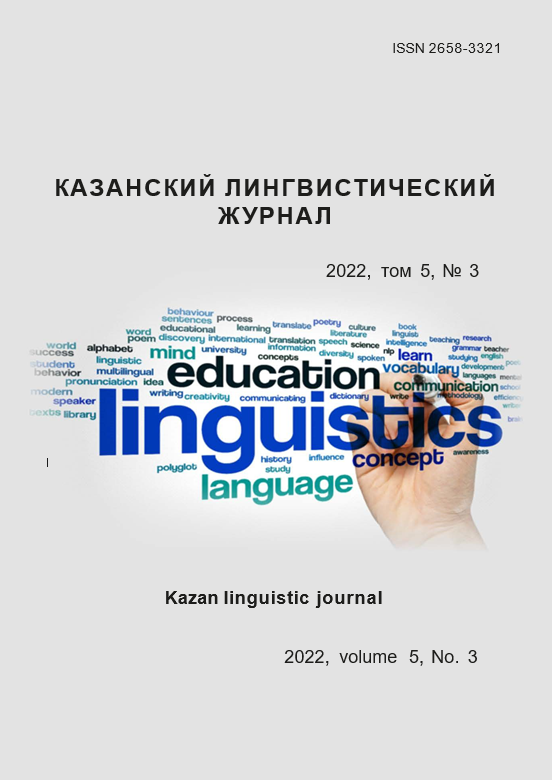The semantic potential of borrowings
https://doi.org/10.26907/2658-3321.2022.5.3.379–388
Keywords:
linguistic and cultural identity, borrowings, semantic potential, seme compositionAbstract
The relevance of the chosen research topic is determined by the fact that the issue of the manifestation of Russian ethnocultural identity in borrowings from the English language in comparison with their English counterparts has so far been considered only in that part of it that concerns only the expansion / narrowing or modification of the structure of the meaning of the borrowed word. However, it seems important to consider not only the semantic structure changes but also the way the ethnocultural identity of the society is fixed in the structure of the meaning of the word in the receptor language. The process of borrowing words from English into Russian is intensifying. Many words are so actively adapted in the Russian language that they are not seen as foreign cultural elements. This is also true for the word boycott, which has entered the Russian language and has been actively functioning since the end of the 19th century. The author examines the semantic potential of the English word boycott and its borrowed counterpart in Russian within 3 stages. At the first stage, the etymology and derivative ability of each of the studied words were under the examination. This work covers the second stage, which included a semantic description of the units of both languages at the level of denotative, functional and connotative levels and the frequency and functional-semantic potential of each of the derivatives of the studied words. The third stage involves the comparison of national specific components in contrasted pairs of words. The practical value of the materials of the article lies in the possibility of using the research materials in the courses of modern Russian and English languages, the theory of language, stylistics, and while developing special courses and special seminars on the problems of sociolinguistics, linguoculturalconceptology, linguocultural studies and pragmalinguistics. The results of the study can be applied when compiling various types of dictionaries and reference books.
References
References
Sternin I.A. Problems of analyzing the structure of the meaning of a word. Voronezh: Izd-vo Voronezh. un-ta; 1979. 156 p. (In Russian)
Kustova G.I. Types of derived values and mechanisms of language extension. M.: Yazyki slavyan. kul’tury; 2004. (In Russian)
Oxford English Dictionary. Available from: https://www.oed.com/ [accessed: 19.07.2021].
Cambridge English Dictionary (CED). Available from: https://dictionary.cambridge.org [ac-cessed: 10.07.2021].
MediaWiki (MW). Available from: https://www.mediawiki.org/wiki/MediaWiki [accessed: 22.07.2021].
WorldNetDaily (WND). Available from: https://www.wnd.com/ [accessed: 23.07.20210].
Maurice Jr M. Labelle. De-coca-colonizing Egypt: globalization, decolonization and the Egyptian boycott of Coca-Cola, 1966-68, published 12 Febrary 2014. Available from: https://www.cambridge.org/core/journals/journal-of-global-history/article/abs/decocacolonizing-egypt-globalization-decolonization-and-the-egyptian-boycott-of-cocacola-196668/E44373FB0DF9CCA6C182B3FE08A8A7A0 [accessed: 16.07.2021].
British National Corpus (BNC). Available from: https://www.english-corpora.org/bnc/ [ac-cessed: 24.08.2021].
Corpus of Contemporary American English. Available from: https://www.english-corpora.org/coca/ [accessed: 23.08.2021].
Bessonova L.E. Foreign language borrowings in the political vocabulary of the early XX cen-tury. 2014. Available from: https://cyberleninka.ru/article/n/inoyazychnye-zaimstvovaniya-v-politicheskoy-leksike-nachala-xx-veka [accessed: 17.07.2021]. (In Russian)
Andreassen N. Vysotskogo otpravili... na pivo. Komsomol’skaya pravda; 2011. (In Russian)
Genis A. Boycott. How to Talk' about Trump while Preserving Family and Friendship. No-vaya gazeta; 2018.07.20. (In English)
Historical articles. The beginning of the conflict between V.I. Lenin and A.A. Bogdanov (1907-1909). Part 3. Available from: https://etargentuma.my1.ru/load/stati/istoricheskie/i_nachalo_konflikta_mezhdu_v_i_leninym_i_a_a_bogdanovym_1907_1909_gg_chast_3/35-1-0-164 [accessed: 18.07.2021]. (In Russian)
Ushakov D.N. Explanatory dictionary of Ushakov. Dictionaries and encyclopedias on the Academic. Available from: https://dic.academic.ru/dic.nsf/ushakov/749214[accessed: 17.07.2021]. (In Russian)
Google Books Ngram Viewer (GBNV). URL:https://books.google.com/ngrams/[accessed: 11.07.2021].






